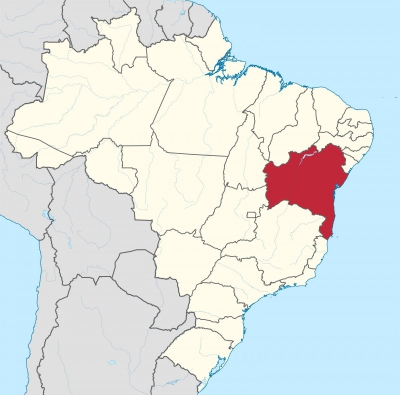Colonial Brazil (Portuguese: Brasil Colonial) comprises the period from 1500, with the arrival of the Portuguese, until 1815, when Brazil was elevated to a kingdom in union with Portugal as the United Kingdom of Portugal, Brazil and the Algarves. During the early 300 years of Brazilian colonial history, the economic exploitation of the territory was based first on brazilwood (pau brazil) extraction (16th century), which gave the territory its name; sugar production (16th18th centuries); and finally on gold and diamond mining (18th century). Slaves, especially those brought from Africa, provided most of the work force of the Brazilian export economy after a brief period of Indian slavery to cut brazilwood.
In contrast to the neighboring Spanish possessions, which had several viceroyalties with jurisdiction initially over New Spain (Mexico) and Peru, and in the eighteenth century expanded to viceroyalties of the Ro de la Plata and New Granada, the Portuguese colony of Brazil was settled mainly in the coastal area by the Portuguese and a large black slave population working sugar plantations and mines. The boom and bust economic cycles were linked to export products. Brazil's sugar age, with the development of plantation slavery, merchants serving as middle men between production sites, Brazilian ports, and Europe was undermined by the growth of the sugar industry in the Caribbean on islands that European powers seized from Spain. Gold and diamonds were discovered and mined in southern Brazil through the end of the colonial era. Brazilian cities were largely port cities and the colonial administrative capital was moved two times in response to the rise and fall of export products' importance.
Unlike Spanish America, which fragmented into many republics upon independence, Brazil remained a single administrative unit under a monarch as the Empire of Brazil, giving rise to the largest country in Latin America. Just as European Spanish and Roman Catholicism were a core source of cohesion among Spain's vast and multi-ethnic territories, Brazilian society was united by the Portuguese language and Roman Catholic faith. As the only Lusophone polity in the Americas, the Portuguese language was particularly important to Brazilian identity.
Bahia ( bə-HEE-ə, Portuguese: [bɐˈiɐ] (listen), [ba-]; meaning "bay") is one of the 26 states of Brazil, located in the Northeast Region of the country. It is the fourth-largest Brazilian state by population (after São Paulo, Minas Gerais, and Rio de Janeiro) and the 5th-largest by area. Bahia's capital is the city of Salvador (formerly known as "Cidade do São Salvador da Bahia de Todos os Santos", literally "City of the Saint Savior of the Bay of All the Saints"), on a spit of land separating the Bay of All Saints from the Atlantic. Once a monarchial stronghold dominated by agricultural, slaving, and ranching interests, Bahia is now a predominantly working-class industrial and agricultural state. The state is home to 7% of the Brazilian population and produces 4.2% of the country's GDP.

1823Jul, 2
Bahia Independence Day: The end of Portuguese rule in Brazil, with the final defeat of the Portuguese crown loyalists in the province of Bahia.
Choose Another Date
Events on 1823
- 2Jul
Portuguese rule in Brazil
Bahia Independence Day: The end of Portuguese rule in Brazil, with the final defeat of the Portuguese crown loyalists in the province of Bahia. - 24Jul
Chile
Slavery is abolished in Chile. - 24Jul
Battle of Lake Maracaibo
In Maracaibo, Venezuela the naval Battle of Lake Maracaibo takes place, where Admiral José Prudencio Padilla, defeats the Spanish Navy, thus culminating the independence for the Gran Colombia. - 22Sep
Golden plates
Joseph Smith states he found the golden plates on this date after being directed by God through the Angel Moroni to the place where they were buried. - 12Oct
Raincoat
Charles Macintosh of Scotland sells the first raincoat.

 English
English  español
español  français
français  português
português  русский
русский  العربية
العربية  简体中文
简体中文 